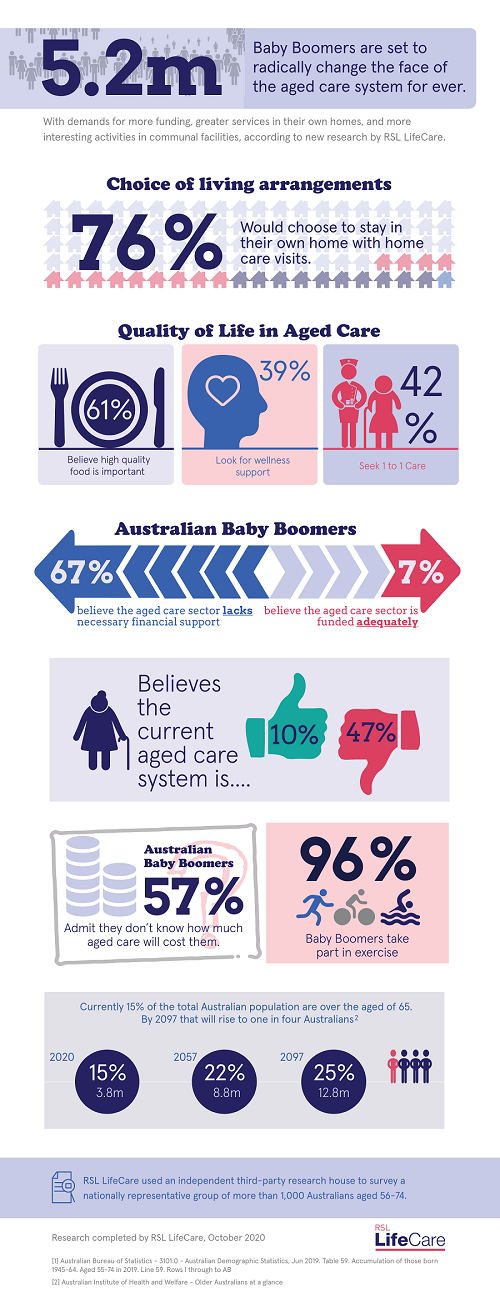- Home
- Residential Aged Care
- Home Care
- Retirement Living
- Support Services
- Aged Care Jobs
- Request Shortlist
on Monday, December 21, 2020
Australia’s 5.2 million Baby Boomers are set to radically change the face of the aged care system forever, with demands for more funding, greater services in their own homes, and more interesting activities in communal facilities, according to new research by RSL LifeCare.
Schooled in rock‘n’roll, the Boomers are more professional, more tertiary educated, more active and have a greater life-expectancy than any previous 60s-plus group.
RSL LifeCare CEO Laurie Leigh said changing generational tastes meant that Baby Boomers, aged between 55 and 74, were poised to change the aged care system for ever.
“Our research has found that Baby Boomers’ priorities for aged care are quite different from previous generations with a greater emphasis on high quality food, exercise opportunities, ‘wellness support’ and travel excursions,” she said.
“That may explain why only 1 per cent of Baby Boomers want to enter communal residential aged care in its current format, as they have perceptions that these services are not currently provided.
“As they get older, three quarters of Baby Boomers want to stay in their own homes with occasional nursing visits, rather than entering communal residential aged care facilities.
“Only 7% of Baby Boomers think the aged care system is adequately funded, with 67% believing it lacks the necessary financial support. However, Baby Boomers largely don’t know how to prepare for the transition to old age, with 57% admitting they don’t know how much care will cost them.”
The research findings could have profound implications for Australia’s aged care system with such a large number of people needing medical care in the next decade, while also wanting to maintain an active and varied lifestyle shared with lifelong friends.
More than 3.8 million Australians, or 15% of the total population, are currently over the age of 65. By 2057, that will rise to 8.8 million, or 22% of the population, and by 2097 it will reach 12.8 million people, or one in four Australians.
Baby Boomers represent 24% of our total population, with the oldest beginning to enter aged care for the first time.
Key findings of the RSL LifeCare research:
Ms Leigh said that more than 1.2 million Australians currently receive some form of government-funded aged care, either in their own homes, or in a residential aged care setting.
More than 750,000 of these older Australians remain in their own homes and receive occasional worker visits.
Over 187,000 others have greater clinical needs and live in permanent communal residential aged care facilities with 24-hour onsite care with a further 184,000 Australians residing in retirement villages.
“As teenagers the Baby Boomers changed our music tastes and then the university system, and their attitudes were now likely to have profound impacts on the way the entire aged care system functions,” she said.
“Baby Boomers are fiercely independent, work longer, live longer, and are renowned for their love of travel and generally enjoying life.
“Our research has found they are turning their backs on the concept of generic group living, and ‘slowing down’, and are looking for more bespoke services that help them through their entire life.”
Find out more about RSL LifeCare.

RSL LifeCare used an independent third-party research house to survey a nationally representative group of more than 1,000 Australians aged 56-74.
Join 10,000+ subscribers for the latest news
